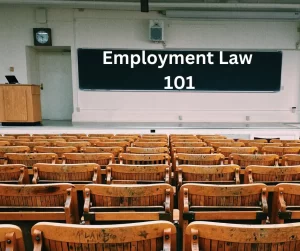
Under Washington State laws, what is “mediation” within the context of civil legal proceedings? Here’s my point of view.
(IMPORTANT: This article is for informational purposes only and is based upon my point of view. Due to the rapidly changing nature of the law, we make no warranty or guarantee concerning the accuracy or reliability of the content in this article. No content on this site, regardless of date, should ever be used as a substitute for direct legal advice from your attorney. Please review our Disclaimer | Terms of Use | Privacy Policy before proceeding.)
Introduction: Mediation
In the context of civil legal proceedings, resolving disputes can be a complex and time-consuming endeavor. Traditional litigation often involves adversarial processes that may strain relationships and escalate conflicts. Mediation, however, offers an alternative approach that focuses on collaboration and resolution rather than confrontation. In this article, we will explore what mediation is within the context of legal proceedings, its principles, and how it can be a valuable tool for achieving mutually acceptable outcomes.
What is Mediation?
Mediation serves as a type of alternative dispute resolution (ADR), employing a neutral third party, referred to as the mediator, to facilitate communication and negotiation among conflicting parties. In contrast to the role of a judge or arbitrator, who makes binding decisions, a mediator aids disputing parties in achieving a voluntary agreement. The mediator typically refrains from advocating for a specific outcome but instead guides the process, emphasizing fairness and equity in the pursuit of resolution.
Key Principles of Mediation
1. Voluntary Participation:
Mediation is a voluntary process, and all parties must agree to participate. This voluntary aspect empowers participants and fosters a sense of ownership over the resolution.
2. Confidentiality:
Confidentiality is a cornerstone of mediation. Parties can openly discuss their concerns, share information, and explore potential solutions without fear that their statements will be used against them in future legal proceedings.
3. Impartiality:
The mediator remains neutral and impartial throughout the process. They do not take sides or express personal opinions, ensuring that the focus remains on the needs and interests of the parties involved.
4. Informality:
Mediation is typically less formal than courtroom proceedings. This informality encourages open communication and allows for creative problem-solving, unencumbered by rigid legal procedures.
5. Mutual Agreement:
The goal of mediation is to reach a mutually acceptable agreement. This emphasis on collaboration distinguishes mediation from adversarial processes, promoting a sense of fairness and cooperation.
How Mediation Works
1. Opening Statements:
The mediator begins by explaining the process and setting ground rules. Typically, each party then has an opportunity to make an opening statement, outlining their perspective on the dispute. NOTE: Prior to the mediation date, the mediator might prompt the parties to each provide a written position statement–that conforms to the mediator’s requirements–for use at mediation.
2. Joint and Private Sessions:
The mediator may conduct joint sessions where both parties are present, as well as private sessions with each party individually. This allows for open communication and confidential discussions.
3. Identifying Issues and Interests:
Through guided discussions, the mediator helps the parties identify the underlying issues and interests driving the conflict. Understanding these factors is crucial for finding common ground.
4. Generating Options:
The parties, with the mediator’s assistance, explore various options for resolution. This phase encourages creativity and flexibility in finding solutions that meet the needs of all involved.
5. Reaching Agreement:
Once the parties agree on a resolution, the terms are formalized into a written agreement. This agreement is not legally binding until both parties voluntarily sign it.
Benefits of Mediation
1. Time and Cost Efficiency:
Mediation often concludes more swiftly and at a lower cost than traditional litigation, making it an attractive option for resolving disputes efficiently.
2. Preservation of Relationships:
Unlike adversarial processes that can strain relationships, mediation fosters communication and collaboration, preserving or even improving relationships between parties.
3. Empowerment and Control:
Participants have greater control over the outcome in mediation, as they actively participate in crafting the resolution, leading to a more satisfying and sustainable agreement.
4. Confidentiality and Privacy:
The confidential nature of mediation provides a safe space for parties to openly discuss their concerns without fear of public disclosure.
Conclusion
Mediation is a valuable alternative within civil legal proceedings, offering a collaborative and flexible approach to dispute resolution. By embracing principles of voluntariness, confidentiality, and impartiality, mediation empowers parties to actively engage in finding solutions tailored to their unique needs. At a time where efficiency, cost-effectiveness, and relationship preservation are paramount, mediation can be a compelling option for those seeking to resolve legal conflicts with fairness and dignity.
Read Our Related Articles
We invite you to read more of our articles related to this topic:
» Employment Law 101: Alternative Dispute Resolution
» Employment Law 101: Definition of Pleading
» Employment Law 101: Depositions
» Employment Law 101: Discovery (WA State)
» Employment Law 101: Legal Theory
» Employment Law 101: Remedies
» Employment Law 101: Statute of Limitations
» Employment Law 101: Summary Judgment (WA State)
» Employment Law 101: The Complaint
» Employment Law 101: The Defendant
» Employment Law 101: The Plaintiff
» Employment Law 101: The Summons
LEARN MORE
If you would like to learn more, then consider contacting an experienced attorney to discuss your case. This article is not offered as legal advice and will not establish an attorney-client relationship with Law Office of Gregory A. Williams or the author of this article; please refer to our Disclaimer | Terms of Use | Privacy Policy for more information.
–gw

